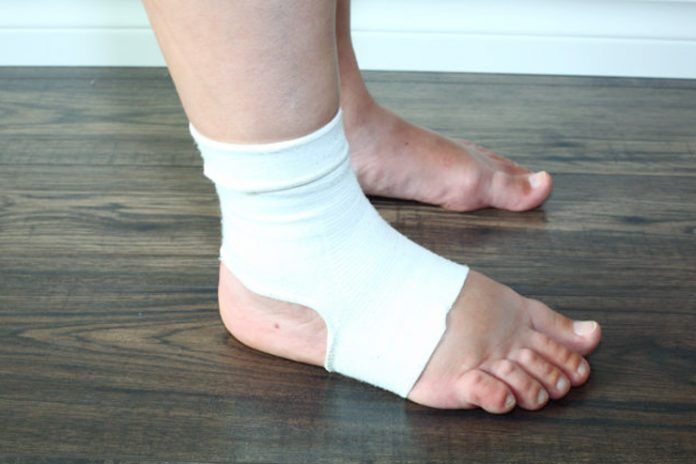Affiliate Disclaimer
Some links in this article are affiliate links. We may earn a small commission if you make a purchase through these links, at no extra cost to you. We only recommend products we find useful to our readersHave you ever gone to bed in good health to wake up the following day with swollen feet? Don’t worry, it’s more common than you would think. Before panicking about potential health issues, spend a few minutes reading this article, and you might learn a simple reason for and an easy solution to combat this problem.
Swollen feet can be caused by several factors, some harmless and temporary and others a sign of an underlying illness. Finding the cause is extremely important in properly treating the condition instead of treating it symptomatically.
This article will cover some of the lesser-known physiological reasons for swollen feet and offer natural remedies to alleviate pain and promote relief.
Read More: 6 Best Foot Spa for Swollen Feet
What are Swollen Feet?
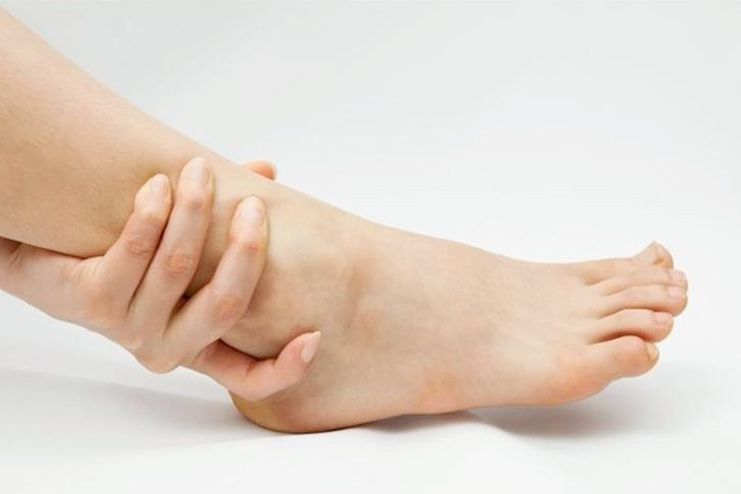
Swollen feet are due to fluid buildup or inflammation from many causes, ranging from trivial trauma to underlying medical illness. Sometimes, a trivial sprain, one you might not even remember, can lead to swelling. However, in most cases, persistent swelling will be due to an underlying medical illness that needs to be treated.
If your feet are swollen and you have other symptoms, it is likely more than a short-term condition. In such cases, short-term home remedies may not be sufficient, and a visit to the doctor may be the best course of action to address the root cause.
Read More: 10 Curable Home Remedies To Relieve Tired Legs And Feet
What Causes Swollen Feet?
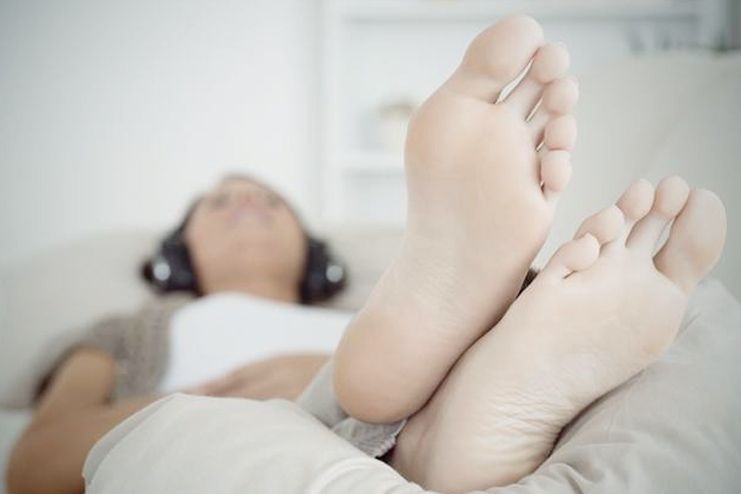
As mentioned earlier, there are many possible causes of swollen feet. They could be something minor, like a simple sprain from an unnoticed injury, or they could indicate a more serious issue, such as edema—fluid retention that shouldn’t be ignored. Identifying the cause is essential to determining whether it requires home care or medical attention.
Some of the common reasons for swollen feet include:
1. Edema: Edema is a condition marked by excess tissue buildup, leading to swelling and puffiness in the affected areas. It can occur for various reasons, with high salt intake being a common trigger. While edema can affect different body parts, it is most commonly seen in the feet, hands, and ankles.
2. Excess Alcohol Consumption: You may not realize it, but alcohol can contribute to swollen feet. Alcohol consumption can lead to water retention, causing temporary swelling in the feet. In most cases, this swelling subsides within a few days. However, if it persists or occurs every time you drink, it may signal an underlying issue—possibly a liver condition. If you notice consistent swelling after alcohol consumption, it’s best to get your vitals checked by a doctor.
3. Pregnancy: Pregnancy is also among the most common causes of puffy feet. During this period, the body retains more water and produces more blood and fluids, leading to fluid retention and swelling, particularly in the feet. The symptom typically appears during the fifth month of pregnancy. Standing for a long time or being on your feet for an extended period can also lead to swelling.
Read More: Natural Remedies for Common Pregnancy Symptoms
4. Lymphedema: This edema develops when the lymph nodes are removed or are not functioning. Lymph nodes filter fluids as they move through the body. When their function is compromised, fluid drainage is affected, which results in accumulation and swelling—in this case, often seen on the feet.
5. Hot Weather: This is a less common cause of swollen feet, but it can affect certain individuals. In hot weather, the body expands blood vessels to improve circulation and regulate temperature. As a side effect, some fluid may leak into surrounding tissues, leading to swelling. People with circulatory issues are more susceptible to weather-related swelling in their feet.
6. Kidney Problems: Kidney impairment is another frequent reason why feet become puffy. Since the kidneys have failed to respond, the excess salt is reabsorbed by the body, causing retained If the excess retained water accumulates, it makes the feet or other parts puffy and tender.
7. Liver Disease: Liver disease is yet another prevalent cause of puffy If the function of the liver is compromised, fluid retention in the body, especially in the feet, will occur, resulting in overswelling. Some prevalent causes of liver disease are drinking too much alcohol, viral infection, and being overweight.
8. Blood Clot: Blood clots can obstruct circulation, reducing blood flow to the heart and other parts of the body. This often leads to swelling in the feet and ankles, typically affecting only one side. If persistent swelling is accompanied by pain or discoloration, it may indicate a serious condition requiring medical attention.
Symptoms Of Swollen Feet:
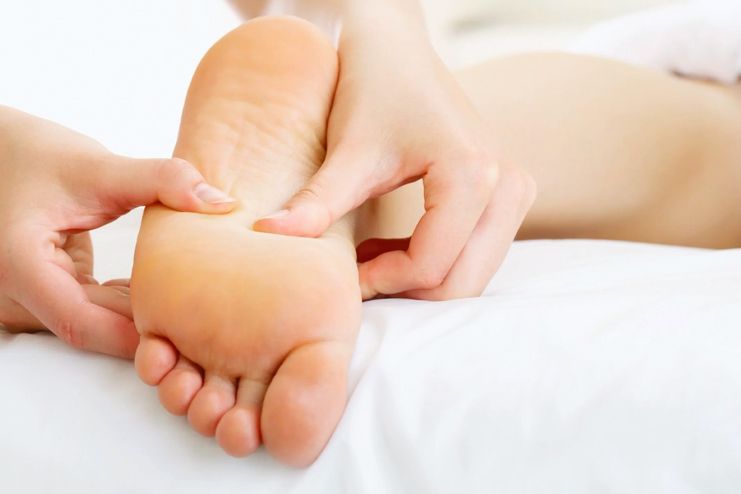
Some of the common symptoms of swollen feet include:
- Inflammation and puffiness around the feet and the ankles.
- Pressing the finger on the swollen feet tends to create indentations that return to their original state of inflammation once the pressure applied to the finger is removed.
- Visible indentations and marks on the feet of the shoes and socks one wears.
- The color of the skin around the inflammation is often paler than the rest of the leg or feet.
- The blood vessels on the feet are visible due to the increased fluid pressure around the feet.
Read More: Swollen Ankles Worry You? Here’s Why and How to Treat Them.
Home Remedies for Swollen Feet

There are many effective home remedies for relieving swollen feet. If you’re looking for simple and natural ways to reduce swelling, this section will guide you through the best options.
1. Aloe Vera:
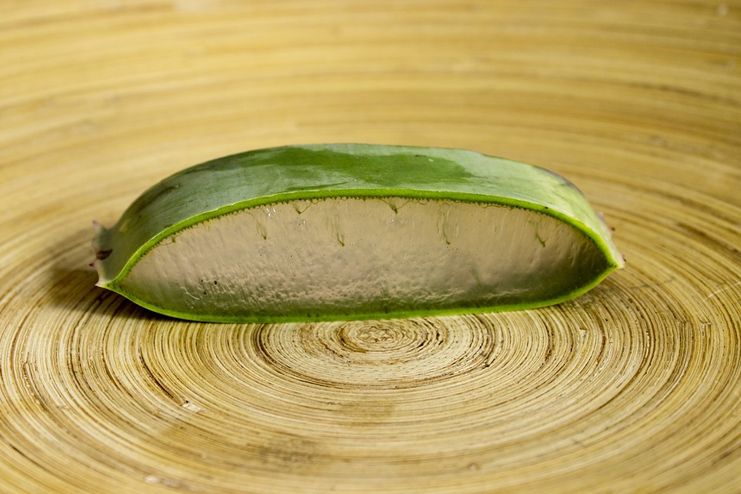 Aloe vera’s high anti-inflammatory quality makes it a perfect inflammation and pain reduction solution. Aloe vera use may reduce swelling and alleviate the pain and discomfort caused by swelling feet.
Aloe vera’s high anti-inflammatory quality makes it a perfect inflammation and pain reduction solution. Aloe vera use may reduce swelling and alleviate the pain and discomfort caused by swelling feet.
What To Do?
- Cut an aloe vera leaf and scoop out the pulp from it.
- Apply this generously to soothe swollen feet.
- Leave it on.
- Repeat this 2-3 times a day to see effective results.
2. Compression Socks for Swollen Feet:
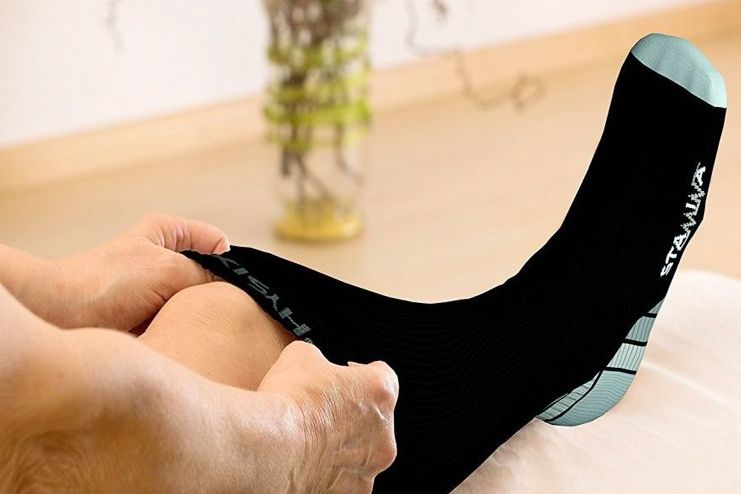
Compression socks are designed with a snug yet comfortable material that helps prevent fluid buildup around the feet and ankles. By applying gentle pressure, they improve circulation and encourage excess fluid to drain, reducing swelling and preventing further discomfort.
What To Do?
- Buy a pair of compression socks or stockings that fit your size for maximum comfort and effectiveness.
- Wear them while walking or staying active during the day to help reduce swelling.
- Use them consistently for a few days to improve circulation and prevent fluid buildup.
- Avoid wearing them at night, as excess pressure without movement can have adverse effects.
3. Apple Cider Vinegar:

Apple cider vinegar has strong anti-inflammatory properties and is rich in potassium, which helps reduce water retention—the leading cause of swelling in the feet, ankles, and surrounding areas.
What To Do?
For the Soak:
- Mix equal quantities of warm water and apple cider vinegar in a tub.
- Wet a towel in that mixture and wring out the excess liquid.
- Wrap your feet in that towel and keep it on for 15-20 minutes.
- Repeat this process once every day to treat swollen feet effectively.
For oral Use:
- Mix two tablespoons of unfiltered apple cider vinegar into a glass of water.
- Drink this once every day in the morning to stop swelling feet.
4. Epsom Salt Foot Soak:
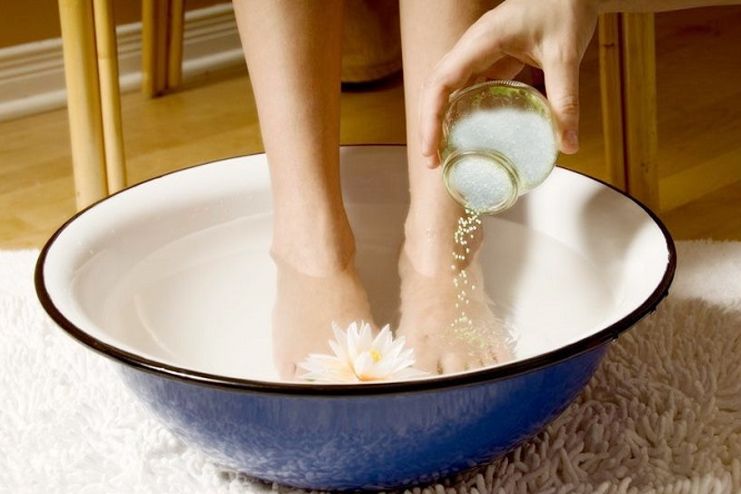
Epsom salt, rich in magnesium sulfate, helps reduce foot swelling by drawing out excess fluid and improving circulation. When dissolved in water, it quickly absorbs through the skin, promoting better blood flow and reducing pain and inflammation, making it an effective remedy for swollen feet.
What To Do?
- Add 2-3 heaping tablespoons of Epsom salt into a warm or cold foot-soak tub full of
- Stir until the salt fully dissolves.
- Soak your feet in the water for 15-20 minutes.
- Repeat this process 2-3 times daily for the best results.
Read More: 12 Benefits of Epsom Salt Bath You Didn’t Know About
5. Baking Soda:
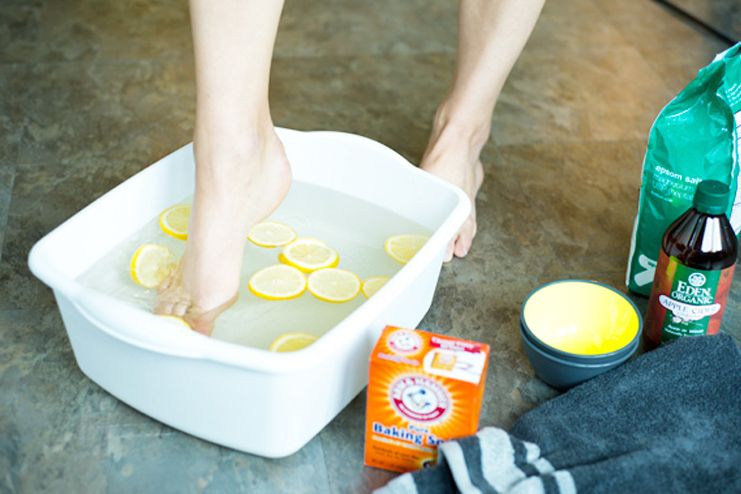
A paste of rice water and baking soda effectively calms inflammation in the feet and ankles. Baking soda is sodium carbonate and has powerful anti-inflammatory properties, whereas the starchy substances present in rice water can pull out excess fluid, thus reducing swelling. This mixture also aids in better blood circulation, offering extra relief.
What To Do?
- After cooking rice, use a strainer to collect and save the rice water.
- Add a few tablespoons of baking soda to the rice water and mix until a smooth paste forms.
- Apply the paste to your feet and let it dry for 15 minutes.
- Rinse off with running water and pat dry with a towel.
- Repeat once daily until the swelling subsides completely.
6. Cabbage:
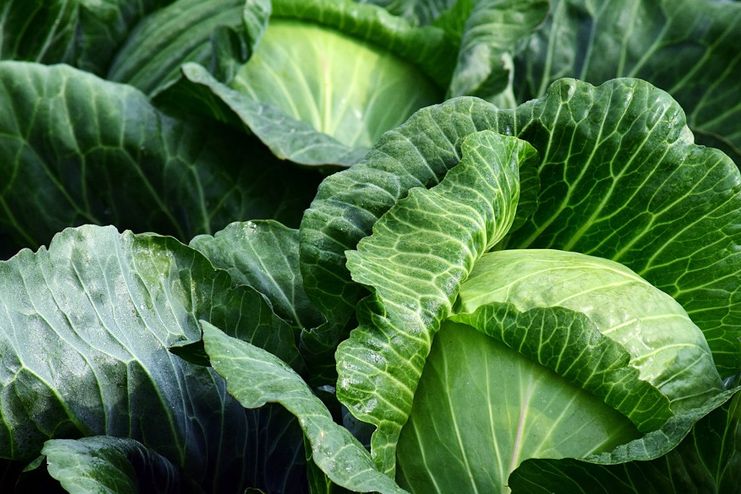 It sounds counterintuitive, but cabbage works exceptionally well at minimizing foot swelling. Its inherent ability to absorb water helps remove excess fluid retention, while its anti-inflammatory components ensure no additional swelling. Thus, cabbage proves to be an essential but potent treatment for puffy feet.
It sounds counterintuitive, but cabbage works exceptionally well at minimizing foot swelling. Its inherent ability to absorb water helps remove excess fluid retention, while its anti-inflammatory components ensure no additional swelling. Thus, cabbage proves to be an essential but potent treatment for puffy feet.
What To Do?
For The Wrap:
- Wrap a few leaves of cabbages around your swollen feet and secure everything with a bandage.
- Leave it on for 30 minutes and then remove them.
- Repeat this a few times till the swelling subsides completely.
For Consumption:
Increase the consumption of cabbage in your daily diet.
7. Cold Compress for Swollen Feet:
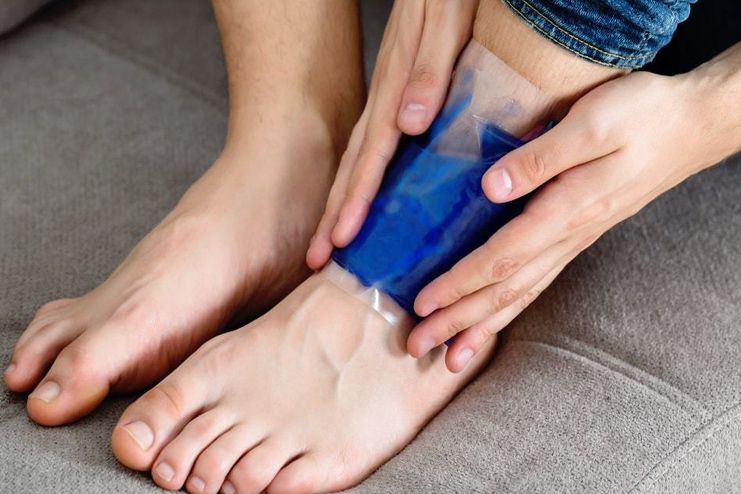
Ice packs or cold compresses help regulate altered blood circulation and soothe swollen feet. This is one of the most common and tried and tested natural remedies for swollen feet, and it does work.
What To Do?
- Freeze an ice pack and place it on the swollen area.
- Keep it there for 10 minutes, moving it every few minutes to prevent numbness.
- Repeat twice a day for effective results.
8. Tonic Water Soak:

Tonic water is nothing but carbonated water, which has a dash of quinine added to it. If the mention of quinine was primarily used as a treatment for malaria. It is also used to reduce swollen feet, as it is packed with anti-inflammatory benefits.
The combination of quinine’s anti-inflammatory properties and the carbonated drink’s relaxant properties helps effectively treat swollen feet.
What To Do?
- Fill a foot tub with tonic water to immerse your swollen feet.
- Let it soak in for 15-20 minutes.
- Remove it from the tonic water and rinse your feet in the normal water.
- Repeat this once every day till the swelling completely subsides.
9. Lemon Juice:
 Lemon juice has tremendous benefits in treating swelling in the feet. Not only that, but it also helps reduce inflammation and pain, often due to water retention in the feet and ankles.
Lemon juice has tremendous benefits in treating swelling in the feet. Not only that, but it also helps reduce inflammation and pain, often due to water retention in the feet and ankles.
Read More: Lemon Water Benefits
What To Do?
- Drink Lemon Water: Mix a few drops of lemon juice with warm water and drink it regularly. You can also add honey for extra benefits.
- Soak Your Feet: Dilute lemon juice with warm water and soak your feet for 10-15 minutes. Rinse and pat dry.
10. Essential Oils Soak:
 A combination of various essential oils as a soak for the feet is very beneficial in not just reducing the inflammation but also providing a relaxing feeling and getting rid of the uneasiness that many feel because of the swollen feet. It has alleviating properties that help with the swelling subside entirely. You can use lavender oil, peppermint oil, eucalyptus oil, or even grapefruit oil to treat swollen feet.
A combination of various essential oils as a soak for the feet is very beneficial in not just reducing the inflammation but also providing a relaxing feeling and getting rid of the uneasiness that many feel because of the swollen feet. It has alleviating properties that help with the swelling subside entirely. You can use lavender oil, peppermint oil, eucalyptus oil, or even grapefruit oil to treat swollen feet.
What To Do?
- Fill a bucket halfway with warm water.
- Add a few drops of essential oil of your choice to the water.
- Soak your feet in the water for 15 minutes.
- Remove your feet and pat them dry with a towel.
- Repeat daily until the pain and inflammation subside entirely.
Read More: 10 Best Essential Oil Blends for Detoxification and Wellness
Apart from the above, there are a few other remedies and tips to treat swollen feet at home. These include:
- Barley Water: Acts as a natural diuretic, flushing out excess fluid and reducing swelling. Boil 25g of barley in 2L of water, strain, calm, and drink throughout the day.
- Coriander Seeds: Known for their anti-inflammatory and diuretic properties, coriander seed water is a popular Ayurvedic remedy for reducing foot swelling.
- Ginger: Helps relieve swelling, pain, and circulation issues. Consume it in your diet, as a supplement, or apply a ginger compress.
- Massage Therapy: Encourages lymph drainage and swelling reduction. Apply firm strokes, thumb pressure, rolling on the ball, or gentle lymph drainage
- Magnesium & Potassium-Rich Foods: Almonds, spinach, bananas, and sweet potatoes help balance fluids, improve circulation, and prevent foot swelling.
Ways To Prevent Swollen Feet
 Now that we know the remedies let us look at ways to prevent swollen feet.
Now that we know the remedies let us look at ways to prevent swollen feet.
- Walking & Movement: Even in short sessions, regular walking improves circulation and prevents fluid buildup. Water walking can provide additional relief for the swollen feet. Avoid sitting or standing longer, which is another reason for swollen feet.
- Less Salt Intake: High salt intake increases water retention, leading to edema in the feet and other body parts. Excess sodium disrupts the body’s fluid balance, causing swelling. Reducing salt consumption can help manage and prevent fluid buildup.
When To See A Doctor For Swollen Feet?
 Swollen feet can indicate underlying health issues. If the swelling persists for more than 4-5 days despite natural remedies or is accompanied by other symptoms, seek medical attention. Consult a qualified professional to diagnose and address any severe conditions.
Swollen feet can indicate underlying health issues. If the swelling persists for more than 4-5 days despite natural remedies or is accompanied by other symptoms, seek medical attention. Consult a qualified professional to diagnose and address any severe conditions.
Final Thoughts:
Swollen feet can often be managed with simple remedies like elevating your legs, reducing salt intake, staying hydrated, and using compression socks. Soaking your feet in Epsom salt, massaging with essential oils, or increasing potassium-rich foods can also help. If swelling persists despite these efforts, it may signal an underlying issue—consult a doctor to rule out severe conditions and ensure proper care.
-
Aug 2018Written by Somapika D
-
March 2025Edited by Vaishnavi
References
- https://www.thehealthsite.com/home-remedies/try-blissful-aloe-vera-foot-soak-for-swollen-feet-kd0918-607870/
- https://www.lybrate.com/topic/home-remedies-for-swollen-feet
- https://www.livestrong.com/article/558277-what-is-the-effect-of-quinine-tonic-water-on-arthritis/
- https://www.hopkinsmedicine.org/health/treatment-tests-and-therapies/ice-packs-vs-warm-compresses-for-pain
- https://www.ncbi.nlm.nih.gov/pubmed/25526231
- https://www.thehealthsite.com/home-remedies/try-blissful-aloe-vera-foot-soak-for-swollen-feet-kd0918-607870/
In this Article













